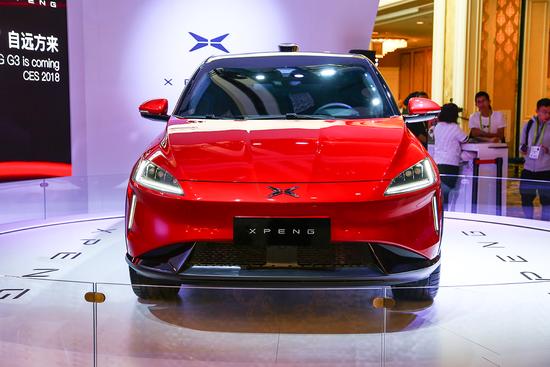Original Title: Exclusive | Xiaopeng Motors to Complete a New Funding Round in January Li Refractory Several internet-based electric vehicles have entered the market, including the Xiaopeng G3, Weilai ES8, Weima EX5, and Betta Concept. These models are part of a growing trend among new energy vehicle startups that are reshaping the automotive landscape. During an interview with the First Financial Journalist at the 2018 International Consumer Electronics Show (CES), He Xiaopeng, Chairman of Xiaopeng Motors, reflected on the emergence of the "new forces" in the car industry since 2014. He pointed out that several pioneers, including Peng Motors, are delivering small batches of cars in 2018, facing fundamental challenges such as quality, differentiation, and organizational systems. However, he emphasized that this is just the beginning. The real test will come in 2020, when the industry will be put to the ultimate challenge. Xiaopeng Motors recently held the launch event for its first mass-produced model, the G3, marking a milestone in China's new energy car sector. This was also the first mass-produced Internet vehicle from a Chinese startup to be unveiled at CES. He Xiaopeng highlighted that the design and user experience are becoming increasingly important, stating, “This is a time to see the face.†The G3 represents version 2.0 of Xiaopeng’s product line, featuring improvements in value, range, reliability, and the introduction of an advanced cockpit system. In response to competition from companies like Weilai and Weima, He Xiaopeng expressed optimism about collaboration within the industry. He believes that working together in areas like new manufacturing and mobility services can lead to greater growth. At the same time, Xiaopeng aims to build a unique type of Internet car tailored for young, tech-savvy, and fashion-conscious users. He stressed the importance of corporate culture and how it is deeply connected to the vision of the founders and their teams. “I am a product originator, focused on user experience and organizational structure,†he said. Xiaopeng Motors was founded in 2014, starting with the development of the “Three Electricity and One Screen†(motors, batteries, electronic controls, and central control screens) as its core technology. In early 2015, the company began R&D on the core systems of Internet-connected vehicles. By September 2016, they released a beta version of the prototype, followed by the first prototype vehicle in February 2017. Over 100 prototypes were tested rigorously before being approved. Through a partnership with Haima Motors, Xiaopeng used Haima’s production license to bring its first product to market in October 2017, becoming the first Chinese internet car company to achieve mass production. Unlike Weilai, which seeks multiple partners, and Weima, which has built its own factories, Xiaopeng took a different approach. In May 2017, the company announced a 10 billion yuan investment in Zhaoqing, Guangdong, to build a large-scale production base covering 3,000 mu. The first phase, with a 4 billion yuan investment, is expected to be completed by 2019, aiming for a production capacity of 100,000 units per year. Weima CEO Shen Hui believes that the automobile industry is highly precision-driven, and while the OEM model can reduce costs, it makes it difficult to control every detail of quality. He Xiaopeng, however, takes a different view. He argues that the timeline is crucial. For over 30 years, China’s auto industry has relied on overseas design, domestic production, and sales. With the integration of full-chain R&D, design, and production, the quality assurance process becomes more comprehensive. He Xiaopeng also noted that the automotive industry is complex and involves multiple stages of 0-to-1 innovation, each carrying significant risk. Therefore, startups should focus on reducing complexity and managing risks through strategic partnerships. At the same time, Xiaopeng is striving to balance its reliance on partners with self-built facilities, ensuring control over detailed parameters and production processes. The car industry is capital-intensive, technology-driven, and operates on a long-term cycle. Since Tesla’s founding in 2003, it has not yet faced the deep financial challenges many startups face today. For new entrants in the auto industry, courage and passion are essential, but so is preparation for a long-term battle. Currently, Xiaopeng’s funding rounds are progressing smoothly. He Xiaopeng revealed that the company expects to complete a new round of financing in January. Earlier reports suggested that Alibaba will continue to support Xiaopeng in its next funding round. With preparations underway in senior management, team building, R&D, manufacturing, and brand development, Xiaopeng is ready to face the real test of the market in 2020. Timing Belt,Lift Door Machine Belt,Elevator Door Machine Belt,Elevator Timing Belt Shanghai Janetec Electric Co., Ltd. , https://www.janetecelectric.com